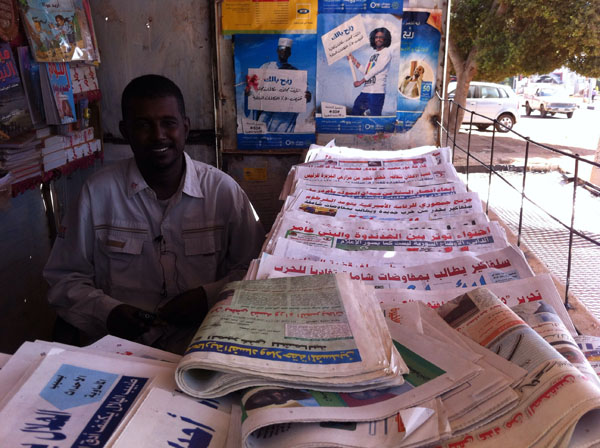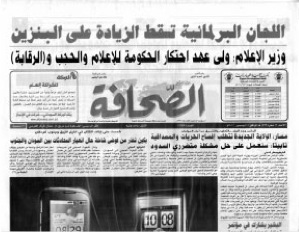
The two most influential independent newspapers in Sudan, Al-Sahafa and Al-Kartoum, have recently been bought by the National Intelligence
Security Service (NISS).
The NISS now owns 90% of all the independent newspapers in the country, according to Alnoor Ahmed Alnoor, the ex-editor in chief of Al-Sahafa.
The NISS purchased 65% of Al-Sahafa’s stock from a company called Bayader and a further 25% from Sideeq Wadaa, a businessman and member of the ruling NCP Party (with the remainder retained by the paper’s founder, Taha Ali Albashir). This follows the purchase of 80% of the stock of Al-Khartoum from its owner, Albagir Abdellah, five months ago.
Ownership represents the final stage in the Sudanese government’s campaign to silence independent voices in the media. Newspapers that refused to tow the NCP line or implement its agendas faced harassment, and fifteen newspapers were forcibly closed following the independence of South Sudan in 2011. Punitive taxes were also imposed, as was the case with the Al-Sudani between 2006 to 2011, which eventually forced the paper’s owner to sell it to a member of the NCP.
Khalid Abdelaziz, a one-time editorial manager of Al-Sudani says: “They used to demand about US$400,000 a year in their campaign against us while leaving their own newspapers paying little tax. They also used regulations to prevent us from the advertising. They gave us a choice, to implement their agendas or to sell our newspaper. We took the second choice”.
The new ownership has been followed by the resignation of key journalist. Interference led to Mozdalfa Osman to step down as editorial manager at Al-Khartoum: “I resigned because of the negative influence on my job and the implementing of NISS’s agenda, which contradicted my professionalism”.
Those that remain face increasing harassment, such as Al-Khartoum’s Mohamed Salih, winner of this year’s Peter Mackler prize, who faces pressure from his new editor-in-chief: “He calls me four times weekly asking to change some of the ideas in my column. I have never worked under such conditions before”.
Independent reporting in Sudanese has had a checkered history. The free press thrived for 57 years from 1903 to 1960 when first dictatorship came to the power. After the revolution of October 1964 independent newspapers once more operated until the second dictatorship in 1969, which nationalized all newspapers considered to have had a socialist orientation. With the second period of democracy, following the revolution of March 1985, another tranche of independent newspapers came into existence. However this once more came to an end when the current regime came to power in a military coup in June 1989.
Before the peace agreement with Sudan people liberation movement (SPLM) in 2005, NCP created shell companies to buy stakes in the newspapers, such as Alrai Alaam one of the oldest newspapers in Sudan. It has been published since 1948. The shell companies began buying stakes in 2002. The same process has been used with Alsahafa and Alkhartoum.
Hayder Almukashfi, who is responsible for the opinion pages on Al-Sahafa, said the newspaper has been greatly influenced by the new owners: “All the pages have been affected by the new polices and the opinion pages have been affected the most. The new owners sacked the previous editor in chief, who had been in the job for years, and have brought another one is a member of ruling NCP. This is an awful situation for freedom of speech in Sudan. The government can now claim there’s no censorship of the press because now the government is the press”.
This article was originally posted on 30 Sept 2013 at indexoncensorship.org





